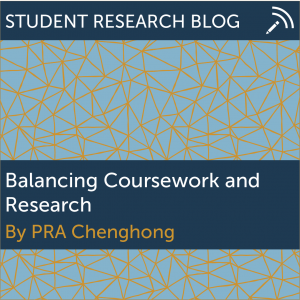By Chenghong Deng, OUR Peer Research Ambassador
 From my experience with research, the more you do, the more you feel you need to do, which makes it important to plan ahead and balance your time between coursework and research so that your academics don’t suffer.
From my experience with research, the more you do, the more you feel you need to do, which makes it important to plan ahead and balance your time between coursework and research so that your academics don’t suffer.
When I first joined a research lab, I was so excited to start working on my own projects. I spent almost all the time I had in the lab. Although I made a lot of progress on my project, I did not work hard enough on my courses.
Before joining a lab, it is vital to think about how much time you have in your schedule to participate in research and how much time you would like to spend in the lab. Look at the number of credits you’re taking in the semester, and the difficulty of the courses, to determine if it’s a good time to start research.
Personally, I’m involved in research in the Molecular & Cell Biology and the Psychology departments. From my experience, I typically spend around nine hours per week in the lab during the academic year. I feel if I work less than nine hours, it is hard for me to collect the data and understand the scientific meanings behind it.
If you don’t have much free time during the academic year, summer is also a wonderful time to focus on research. Last summer, I received the Summer Undergraduate Research Fund (SURF) Award. I worked in Dr. Malone’s lab full-time for 9 weeks. By focusing only on my project, and not needing to worry about my classes, I learned much more than during the academic year.
To sum up, working in a research lab needs a lot of time and energy. Thinking about the time you have to devote to research before starting is important.
Chenghong is a senior majoring in Molecular & Cell Biology and minoring in Psychological Sciences and Bioinformatics. Click here to learn more about Chenghong.